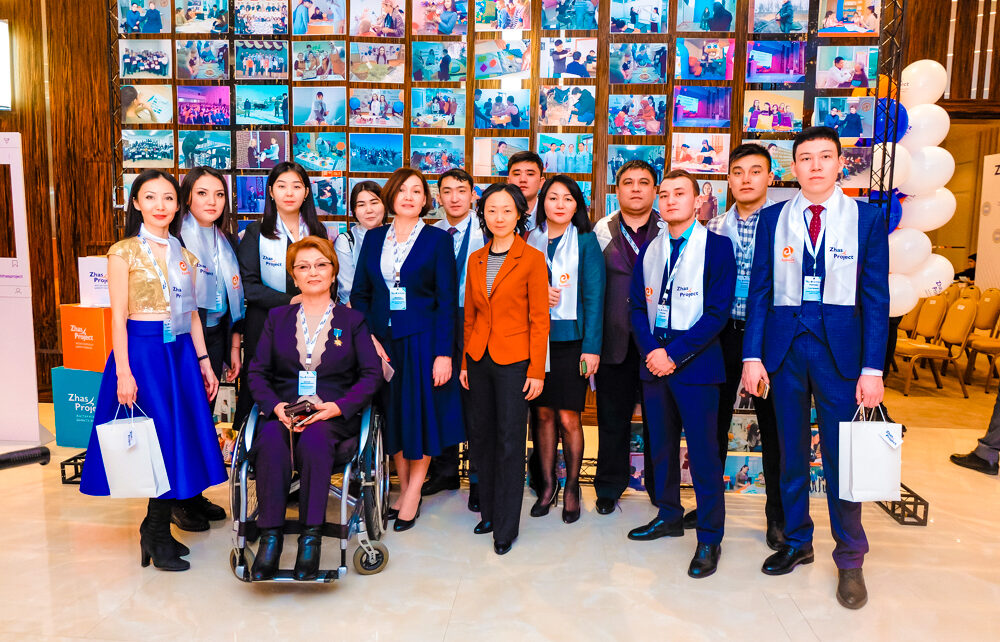Context: The population of Kazakhstan is approximately 19 million (2021), of which 20.2 per cent are youth (those aged 14–29, as defined in Kazakhstan). Kazakhstan holds the leading economic position in Central Asia, generating 60 per cent of the subregion’s Gross Domestic Product. However, since 2005, the country has been experiencing a decline in terms of the Global Competitiveness Index due to slower productivity growth. The Government acknowledges that efforts must be made to increase worker productivity, especially among youth, for the future of the country. This would require, among other factors, better knowledge and skills in the workforce. Although the youth unemployment rate remains low, 3.6 per cent (2021), the Government has recognized that the country’s youth are key to a determining factor of the future and, therefore, has devised initiatives to empower them.
Implementation of programme/ initiative: In 2017, the Youth Corps (ZHAS) project began to be implemented as part of a partnership between Kazakhstan’s Ministry of Education and Science, and the World Bank, with a total budget of approximately USD 21 million. The project aims to promote youth engagement and enhance life skills through a community-based service-learning programme, especially for vulnerable youth. It also aims to support them in their employment and professional development. Young people (those aged 14–29) who are not in education or employment, are prioritized participants in the project. Covering six months, the project encompasses four components: training on life skills development and project management; increasing outreach to vulnerable young people; building effective youth awareness-raising campaigns; and offering grants up to USD 2,300 for youth groups, of three to five people, to carry out social projects. Moreover, during the project implementation period, all participants have mentors to support them. In addition to grant funding, the participants are given an allowance of USD 90–140 for the entirety of their time working on social projects.
Main challenges: The operations of ZHAS are not category-oriented, therefore, each project is highly unique. As a consequence, participants have reported feeling that they have not been able to meaningfully grow socially, as they have had to only focus on their proposed line of work. Although they have enhanced their skills in this particular area, participants hope to widen the scope in future social projects to gain a broader range of expertise in the long-term.
Results achieved: As of August 2021, the project has brought together over 9,700 young people from different parts of Kazakhstan, generating ideas that have contributed to youth development. Some 60 per cent of the young people were unemployed and from lower-income families. The project has implemented nearly 3,000 socially significant ideas, covering diverse initiatives, including cultural heritage, entrepreneurship, healthy lifestyles, journalism, resolving pollution, recycling and waste management. In particular, women have been able to master new and in-demand professions (namely manicure, pedicure and self-care) and have opened beauty clinics of their own. Currently, graduates of ZHAS are continuing to develop and expand their businesses.
Moving Forward: As of August 2021, the project has been extended until March 2022, to utilize the remaining project savings and advance institutional development of the Committee on Youth Affairs, and to organize further youth policy implementation projects under the Ministry of Education and Science. These projects are to address the pressing needs of supporting central and local governments to put in place measures that will help vulnerable youth in the post-COVID-19 economic recovery period.
Replicability: The success of ZHAS is reflected among the youth in Kazakhstan that have, following targeted training, now become successful social entrepreneurs and businessowners. They have shown that changes are possible by skills development and promoting individual growth. ZHAS demonstrates that this direction, through youth-led initiatives, can better respond to improving youth policies and programmes in the country. Furthermore, the project provides useful lessons in showing how increasing the number of more-skilled young candidates can enhance development in socioeconomic terms and beyond.
Acknowledgement:
This good practice was kindly prepared by Ms. Alysha Brahmantiara Putri.
References:
https://projects.worldbank.org/en/projects-operations/project-detail/P127966
https://astanatimes.com/2020/12/zhas-project-unites-youth-facilitates-social-entrepreneurship/
Project Details
Date: August 25, 2021
